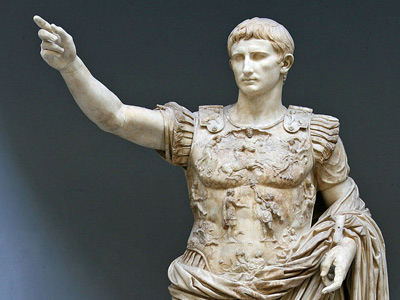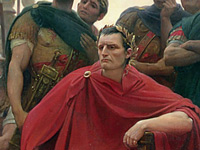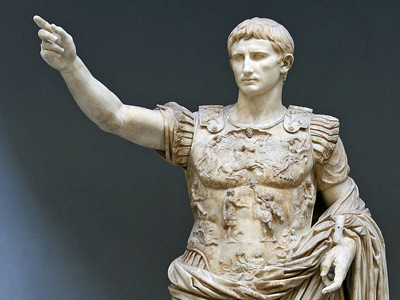Final War of the Roman Republic (32-30 BC)

Land Campaign
Even though Octavian wanted to immediately pursue Antony and Cleopatra, many of his veterans wanted to retire and return to private life. Octavian allowed many of his longest serving veterans (as many as 10 legions by some accounts) to retire. Many of those legionaries could trace their service to Julius Caesar Julius Caesar (100-44 BC), was a Roman politician and general who played a critical role in the events that led to the demise of the Roman Republic and the rise of the Roman Empire. Caesar is considered by many historians to be one of the greatest military commanders in history. Julius Caesar » some 20 years earlier.
Julius Caesar (100-44 BC), was a Roman politician and general who played a critical role in the events that led to the demise of the Roman Republic and the rise of the Roman Empire. Caesar is considered by many historians to be one of the greatest military commanders in history. Julius Caesar » some 20 years earlier.
After the winter ended, Octavian resumed the hunt. In the spring of 30 BC, Octavian rejected the idea of transporting his army across the sea and attacking Alexandria directly, and instead traveled by land through Asia. Antony had received much of his backing from Rome’s client kingdoms in the east. By marching his army by land, he ensured Antony could not regroup and cement his authority over the provinces.
Meanwhile, Antony attempted to secure an army in Cyrenaica from Lucius Pinarius. Unfortunately for Antony, Pinarius had switched his loyalty to Octavian. When Octavian received word of this development, he ordered Pinarius to move his four legions east towards Alexandria while Octavian would move west. Trapped in Egypt with the remnant of his former army, Antony and Cleopatra bided their time awaiting Octavian's arrival.
When Octavian and Pinarius arrived at Alexandria, they placed the entire city under siege. Before Octavian had arrived, Antony took the roughly 10,000 soldiers he had left and attacked Pinarius, unaware that he was outnumbered 2 to 1. Pinarius destroyed what was left of Antony’s army with Antony escaping back to Alexandria before Octavian arrived. As Octavian approached with his legions, what remained of Antony's cavalry and fleet surrendered to Octavian. Most of Antony’s infantry surrendered without any engagement at this stage of the conflict, and Antony's cause was lost.
Antony was forced to watch as his army and hopes of dominance in Rome were handed to Octavian. In honorable Roman The Roman Republic was a form of government of Rome and the era of the classical Roman civilization when it was run through public representation of the Roman people. Beginning with the overthrow of the Roman Kingdom (traditionally dated to 509 BC) and ending in 27 BC with the establishment of the Roman Empire, Rome's control rapidly expanded during this period - from the city's immediate surroundings to hegemony over the entire Mediterranean world. tradition, Antony, on August 1, 30 BC, fell on his sword. According to the ancients accounts however, he was not entirely successful and with an open wound in his belly, was taken to join Cleopatra, who had fled to her mausoleum. Here Antony succumbed to his wound and supposedly died in his lover's arms, leaving her alone to face Octavian.
The Roman Republic was a form of government of Rome and the era of the classical Roman civilization when it was run through public representation of the Roman people. Beginning with the overthrow of the Roman Kingdom (traditionally dated to 509 BC) and ending in 27 BC with the establishment of the Roman Empire, Rome's control rapidly expanded during this period - from the city's immediate surroundings to hegemony over the entire Mediterranean world. tradition, Antony, on August 1, 30 BC, fell on his sword. According to the ancients accounts however, he was not entirely successful and with an open wound in his belly, was taken to join Cleopatra, who had fled to her mausoleum. Here Antony succumbed to his wound and supposedly died in his lover's arms, leaving her alone to face Octavian.
Cleopatra did not immediately follow Antony in suicide. Instead, in a last-ditch effort, Cleopatra opened negotiations with Octavian. Cleopatra begged Octavian to spare Caesarion’s life in exchange for willing imprisonment. Octavian refused. Within a week, Octavian informed Cleopatra that she was to play a role in Octavian's Triumph back in Rome. This role was "carefully explained to her", while Caesarion was "butchered without compunction". Octavian supposedly said "two Caesars are one too many" as he ordered Caesarion's death. According to Strabo who was alive at the time of the event, Cleopatra died from a self-induced bite from a venomous snake, or from applying a poisonous ointment to herself. Learning of Cleopatra's death, Octavian had mixed feelings. He admired the bravery of Cleopatra, and gave her and Antony a public military funeral in Rome. As they left Alexandria, a new age dawned when Rome annexes Egypt. With Cleopatra's death, the final war of the Republic was over.
HISTORY

RESOURCES
This article uses material from the Wikipedia article "Final War of the Roman Republic (32-30 BC)", which is released under the Creative Commons Attribution-Share-Alike License 3.0.
© Stories Preschool. All Rights Reserved.









